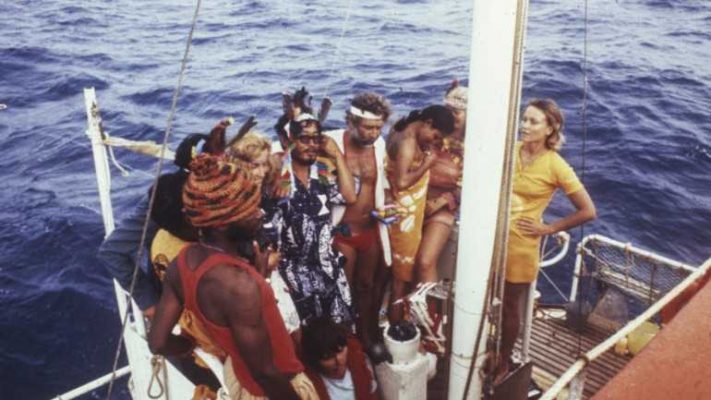@Filmhouse, Edinburgh from Fri 8 Feb 2019
In 1973, anthropologist Santiago Genoves set out to cross the Atlantic with ten strangers in a purpose-built raft. His aim was to study the human instinct for conflict and violence. Not only did he think that the claustrophobic and perilous conditions onboard would increase the chances of friction; he ensured that the crew was split along gender lines, as well as by ethnicity and faith. Surely all he had to do was sit back and record the ensuing fireworks?
Marcus Lindeen’s documentary contrasts the late Genoves’ own words (voiced by Zama actor Daniel Giménez Cacho), with the recollections of the seven surviving crew 45 years later. Lindeen carries out these interviews and discussions on board a full-scale wooden replica of the original raft, the Acali, in a blacked-out sound stage. The result is not so much a post-morten of the voyage itself, but a dissection of the ego and character of the man behind it.
The Raft works best as it details Genoves’ assumptions being hauled out from under him. Besides a few disagreements the group got along in relative harmony. Far from the masculine strutting the anthropologist was certain would ensue when a group of men are cast adrift with attractive women, the sex that did take place failed to ignite any jealousies. Great editing between past and present shows an unhappy Genoves to be the antagonist of his own experiment. He deliberately tries to engineer discord and tension in an attempt to make the outcome match his pre-conceived conclusions – a flagrant case of begging the question.
That the premise of the Acali experiment immediately brings to mind tired reality show formats like Big Brother and Love Island further undermines Genoves’ pompous claims that it was a purely anthropological undertaking in search of world peace. Coverage of the experiment at the time was unsurprisingly salacious, focusing solely on the erotic potentiality of the environment, much to Genoves’ frustration. Media coverage of the documentary suggests, to the shock of no-one, that little has changed.
It’s unavoidable that the placid, almost Utopian dynamic of the crew limits the dramatic potential of the documentary itself – ironic given its inherent criticism of the sensationalist contemporary coverage. The use of the replica raft for the crew’s recollections also feels a little unnecessary; as if Lindeen wasn’t entirely confident in the power of the story in itself. This stylistic choice feels like Lars Von Trier’s Dogville, which draws conclusions about humanity much closer to Genoves’ hypothesis than his own experiment.
The remaining crew of the Acali come to the conclusion that, despite the intentions of its instigator, the experiment was a qualified success overall. The same is true of the documentary.
